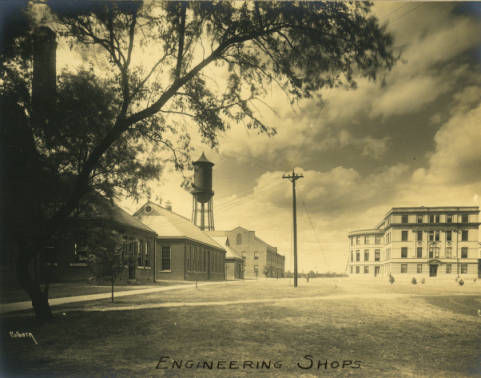Throwback Thursday: Marston Hall

Engineering II, later Marston Hall, pictured from the south in 1903. The Marston Water Tower as well as engineering shops are seen to the left of Marston Hall.
October 3, 2017
Marston Hall
Pictured in 1903 from the south, and again in early October 2017.
In the archive photo from 1903, Engineering II (later Marston Hall) stands to the right. There are engineering shops to the left. Marston Water Tower is in the background.
In the modern photo, there are trees partially obstructing the view. Hoover Hall and construction for the new student success center are seen in the background.
Construction on Engineering II finished in 1903. It would not be until 1947 that it would be renamed after Anson Marston, the first Dean of Engineering, who spearheaded its construction.
Anson Marston was born May 31, 1864 in Seward, Illinois. He received his bachelors degree in civil engineering from Cornell University in 1889.
In 1892, Marston joined the staff of Iowa State College as both a professor and head of the civil engineering department. He maintained these roles until 1917.
In 1904, Marston became dean of the Division of Engineering. He maintained this role until 1932 when he resumed his teaching duties, however he was named senior dean until his retirement in 1937.
Marston had a role in many civil engineering projects in both Ames, other cities and the Iowa State community. Not only did he design the Marston Water Tower, he spearheaded the construction of Engineering II, which later became Marston Hall.
According to a biography published by the university, he designed Iowa State’s sewage system, he supervised the construction of the Campanile and Lake LaVerne, took on many consulting jobs for the city of Ames and other cities, and even served in the military.
In 1917, Marston served as a major in the Engineering Corps and was promoted to Lieutenant Colonel in 1918. In 1924 he served as a colonel for four years in the U.S. Reserve Corps.
Marston also started the Iowa State Highway Commission (later the Iowa Department of Transportation). It was Marston’s firm belief that roads should be designed and maintained by engineers who are trained as opposed to local officials. This belief lead him to create the commission,
Marston died on October 21, 1949 due to injuries sustained from a car accident. Marston’s brother, Walter, lost control of a vehicle due to rainy weather resulting in wet road conditions.






